Introduction
Navigating the world can be overwhelming for children with Autism Spectrum Disorder (ASD) due to their heightened sensory experiences. Understanding these sensory needs is vital for parents to provide the right support for their children. With autism affecting 1 in 36 individuals, it is crucial to recognize both hypersensitivity and hyposensitivity in children with ASD.
Each child may require different adaptations or supports to create an autism-friendly environment. Technology, such as AR applications, can play a significant role in creating more accessible environments for children with autism. Ongoing education is essential for parents to stay informed about new findings, treatments, and therapeutic approaches.
By being well-informed and observant, parents can become better advocates for their children, bridging the gap between their sensory world and the world they navigate together.
Understanding Sensory Needs in Autism
Navigating the world can be a sensory-loaded experience for children with Autism Spectrum Disorder (ASD), where sounds, textures, and lights are amplified beyond what many of us can fathom. These sensory experiences can profoundly influence their behavior, learning, and development. For parents, comprehending the intricate dance of sensory processing—the way proprioceptive, tactile, and vestibular systems work in concert—is pivotal.
It enables them to tailor their support, ensuring their child's environment is conducive to their unique sensory profile.
Understanding that children with ASD may react differently to sensory stimuli, with some finding certain textures unbearable or specific sounds jarring, is the first step. With autism affecting 1 in 36 individuals, awareness is growing, and so is the importance of recognizing both hypersensitivity and hyposensitivity in these children. This dual possibility of sensory experiences means that no two children with ASD are the same; each may require different adaptations or supports.
Consider the case of designing an AR application to convert tactile sensations into visual and auditory signals, which reflects the heightened sensitivity to touch and relative ease with visual and sound stimuli in the autistic community. Such innovations highlight the potential for technology to aid in creating more autism-friendly environments.
Moreover, as parents, ongoing education is essential. As one parent emphasizes, "There are always new findings, treatments, medications, and therapeutic approaches. It's important to stay current..." Continuous learning and consulting with experts can guide parents in making informed decisions about their child's care—understanding the benefits and risks of prescribed medications or therapies.
It's clear that sensory issues are more than a mere discomfort; they are a core aspect of autism that requires our understanding and empathy. By staying informed and observant, parents can become better advocates for their children, creating a bridge between the sensory world their child experiences and the one they navigate together.
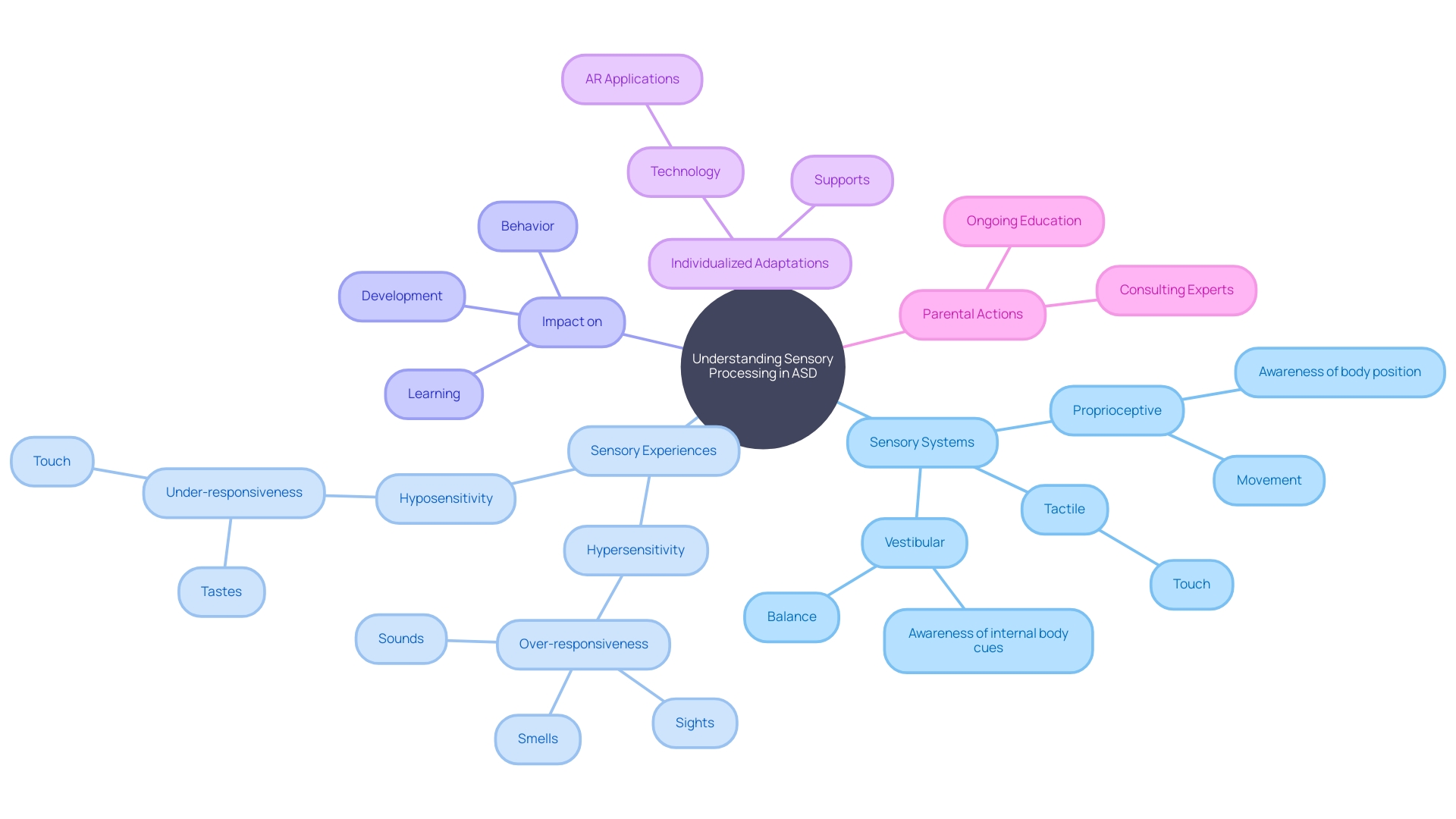
The Role of Parent Advocacy
Representing the voice of a child with autism involves more than just advocacy; it's about understanding complex systems and securing the resources necessary for their growth and equity in society. Dr. David (Dan) R. Offord's philosophy, likening growing up to a race where fairness is essential, encapsulates the importance of equitable opportunities for children with disabilities. Inclusive environments where children can participate in school, home, and leisure activities contribute significantly to their mental health and the well-being of families.
It is imperative for parents to stay abreast of the latest research, including emerging treatments and medications, as well as therapeutic approaches, while deciphering the benefits and risks involved. The impact of the digital age on healthcare, such as the innovative text-based pediatric care offered by Summer Health, highlights the need for clear communication between medical professionals and families. With ongoing debates in the field, such as the intensity of early intervention therapies for autism, parents must navigate a landscape of diverse opinions and studies to find what best supports their child.
The transition toward open science, as described by Michael M. Crow and Greg Tananbaum, promises to make scientific knowledge more accessible, benefiting not only researchers but families seeking to understand and support their children's unique needs.
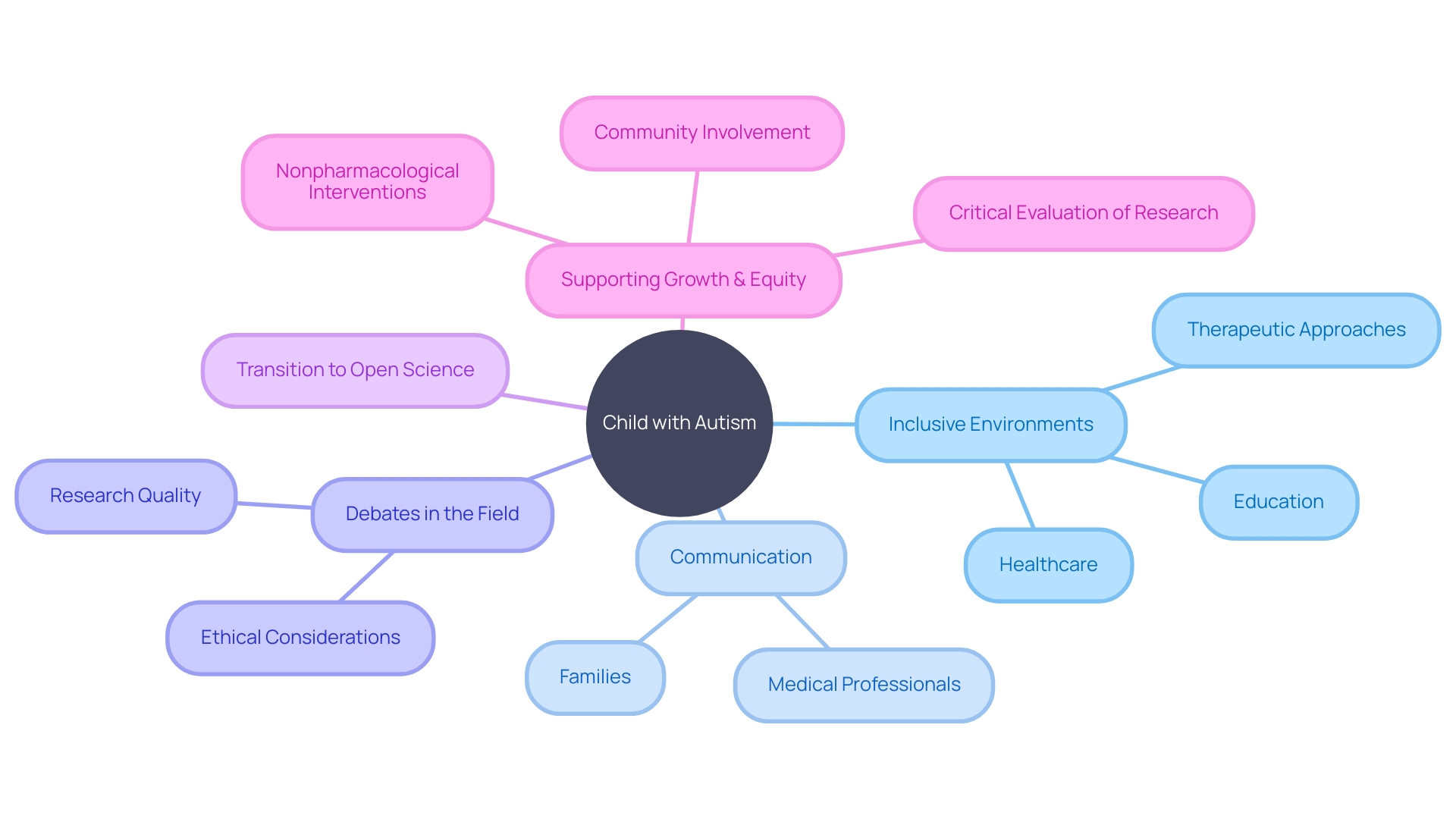
Coping Strategies for Parents
Navigating the parenting journey with an autistic child involves more than just day-to-day care; it requires a continuous commitment to learning and adapting. As our understanding of autism evolves, so do the treatments, medications, and therapeutic approaches. Keeping abreast with these advances ensures that parents can make informed decisions about their child's treatment plan.
This includes a deep dive into the pros and cons of prescribed medications, a task that demands a careful balance between research and intuition, as the internet—while a treasure trove of information—can also lead to questionable treatments that may do more harm than good.
Incorporating stress-reduction techniques such as mindfulness or exercise is not just beneficial for the parent's well-being, but it is crucial for maintaining the mental health of the whole family. As Dr. David (Dan) R. Offord, a renowned child psychiatrist, once said, ensuring a 'fair race' for our children includes recognizing their unique needs as well as their strengths. It's about reducing stressors and providing robust support that allows them to thrive in school, at home, and in leisure activities.
Recent studies, such as the one by Sally Ozonoff and the Baby Siblings Research Consortium, underscore the importance of staying current on autism research to better support our children. The study, which spans research sites across North America and the UK, reaffirms the likelihood of autism in siblings, indicating the value of knowledge for families with more than one child on the spectrum.
Finally, it's essential to foster a positive perspective on autism. As Dennis Kimbro said, 'Life is 10% what happens to us and 90% how we react to it.' Embracing autism as an inspiring part of life can lead to personal growth and a stronger community.
By adopting a holistic approach that combines self-care, ongoing education, and positive reinforcement, parents can ensure that they are well-equipped to support their child's sensory needs while also taking care of their own well-being.
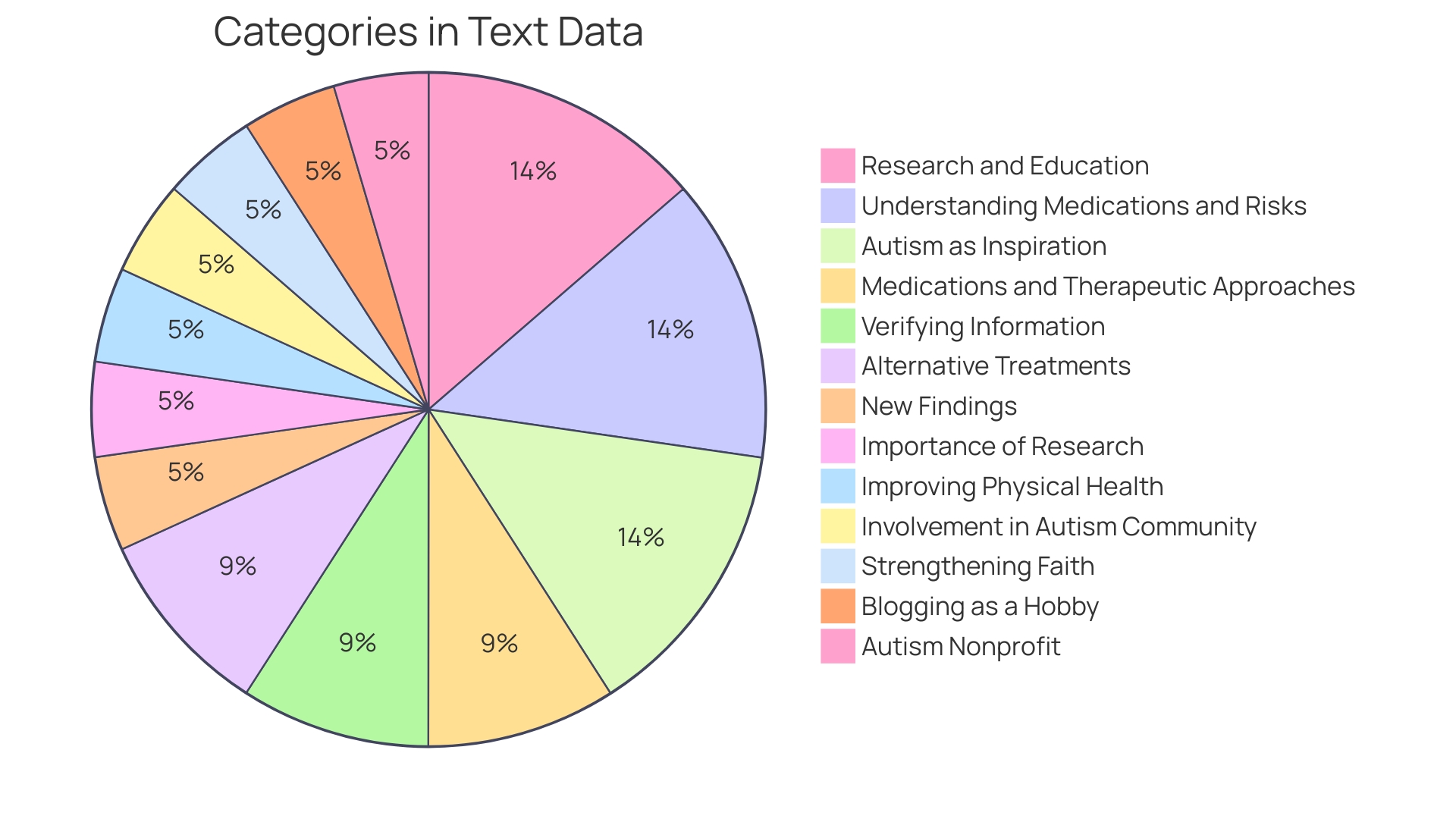
Resources for Parent Advocates
Navigating the journey of parenting a child with autism involves continuous learning and adapting. With the ever-evolving landscape of treatments, therapies, and educational approaches, staying informed is not just a choice but a necessity. The wisdom shared by Nicoletta LaMarca Sacco, an impassioned Disability activist and mother, underscores the importance of challenging conventional wisdom and seeking connections to forge a common understanding.
Her dedication to social justice and advocacy for children with special needs reflects the collective effort required to support neurodiverse individuals.
For instance, the transformative experience of Mr. Harris and his son, Josh, who found a voice through picture boards, illustrates the profound impact that accessible communication methods can have. Mr. Harris's advocacy has led to the international recognition of the need for such tools, proving that with the right resources, children with communication difficulties can thrive.
Furthermore, the Kevin and Avonte Program epitomizes proactive community engagement by addressing the critical issue of wandering, which affects many families with autistic children. Through education, awareness, and emergency preparedness, the program honors the memory of two autistic teens and strives to prevent similar tragedies.
Parents must also become well-versed in the medical aspects of their child's care. It is essential to assess the benefits and risks of prescribed medications, as well as to remain vigilant for any behavioral changes. This due diligence, along with verifying information from credible sources, equips parents with the knowledge to make informed decisions.
The AT-Newswire Press Release News Distribution Service and Top Tech Tidbits stand as beacons of accessible technology news, connecting professionals and enthusiasts in the field of neurodiversity. These platforms provide invaluable insights and updates that benefit parents and caregivers in their quest for supportive resources.
Moreover, stories of individuals like Jeff, who has forged his path with the support of mentors and family, celebrate the potential and achievements of neurodiverse individuals. Such narratives inspire and reassure parents that with the right support, their children can lead fulfilling lives.
In conclusion, the collective efforts of advocacy, research, and community support play pivotal roles in shaping a world where children with sensory needs can excel. The resources, strategies, and networks available to parents are conduits for empowerment, fostering a supportive community that thrives on shared knowledge and mutual support.
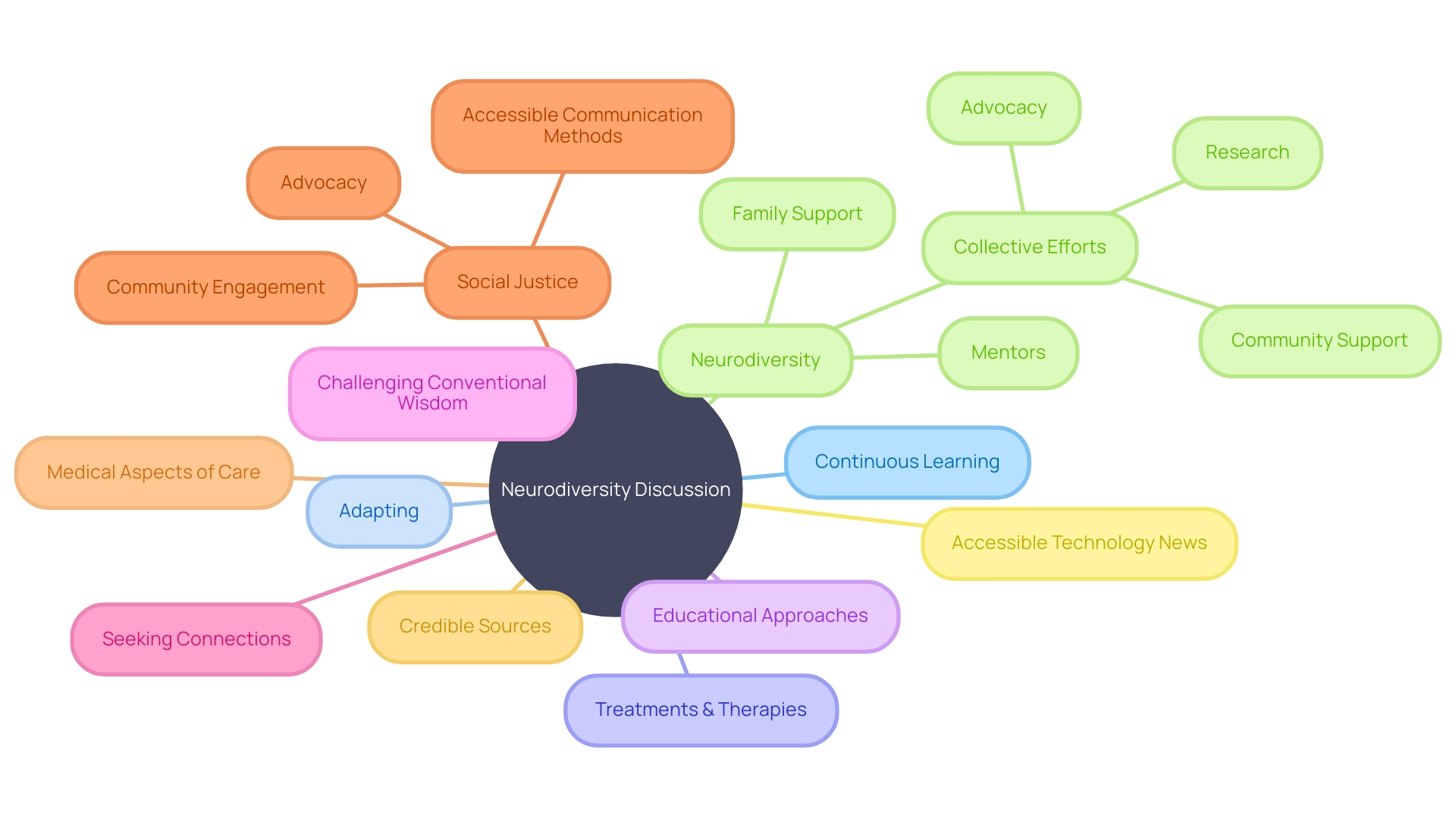
Building a Support Network
Establishing a network of support is a cornerstone for those caring for children with unique challenges. Immersing oneself in a community of parents, specialists, and support networks can lead to a wealth of resources and emotional backing. Parents who have endured the trials of raising children affected by the digital age's pitfalls, such as the adverse effects of social media, often form such groups.
The Parents’ Network is a testament to this, born from the shared experiences of pain and a commitment to prevent future suffering for others. Similarly, the Canadian Institutes of Health Research's Strategy for Patient-Oriented Research highlights the importance of including patient-partners—those with direct experience of health conditions, including parents—in research efforts. This approach not only enhances the relevance of the research but also leads to better health outcomes and a more accountable healthcare system.
The transformative power of these networks is also evident in individual stories. For instance, Saundra Gumerove's journey from a successful lawyer to a dedicated advocate for her daughter with Sturge-Weber Syndrome exemplifies the profound impact that caring for a child with special needs can have on a parent's life. By connecting with others who understand, parents like Gumerove can find solace and strength.
Support groups and online forums offer invaluable platforms where these connections thrive, fostering knowledge exchange and empowering parents to become effective advocates. The National Center for Systemic Improvement further empowers parents by offering resources and training for those eager to participate in policy and service development. These collaborative efforts underscore a crucial principle: nothing about us, without us.
As research and personal narratives suggest, the involvement of parents with firsthand experiences in shaping the services and policies that affect their lives leads to more inclusive and beneficial outcomes for all.

Effective Parenting Strategies
For children with autism, establishing a consistent routine is crucial. This approach can alleviate the stress of unpredictability and foster an environment where they can thrive. Consistency helps children anticipate what's next, which is reassuring and can significantly reduce anxiety levels.
Reinforcing positive behaviors is equally important. By acknowledging and rewarding their efforts, we encourage them to continue these behaviors, creating a positive feedback loop. This can be as simple as offering verbal praise for a job well done or providing a small reward for a specific achievement.
Both strategies work together to support skill development and behavioral management, paving the way for children to engage confidently in daily activities. In the words of Dr. David (Dan) R. Offord, "Growing up in Canada is like a race. I do not mind if my children are in a race as long as the race is fair."
Fairness, in this context, means providing the necessary resources and support to ensure all children, including those with autism, can participate fully in their communities. As we embrace the latest research and data-driven insights, such as those from The Center for Discovery, we can better predict and mitigate behaviors, ultimately creating a more equitable environment for autistic children to grow and succeed.
Advocacy Skills
Enhancing advocacy skills goes beyond just speaking up; it involves a deep understanding of your child's needs and the ability to navigate complex systems to obtain necessary support. Parents, as advocates, must adeptly communicate with healthcare professionals, educators, and social services to ensure their children receive the care and accommodations they need. This includes collaborating with multidisciplinary teams to create and implement effective plans for care and education.
For instance, in the realm of patient-oriented health research, there's a growing emphasis on including patient-partners—those with firsthand experience of health conditions, including parents and caregivers—in research teams. The Canadian Institutes of Health Research advocates for such involvement to ensure that research and its outcomes are truly beneficial to patients and their families.
In the fast-paced world of medical care, where pediatricians are often swamped with administrative tasks, such as transcribing detailed medical shorthand into comprehensive visit summaries, parent advocates play a crucial role. By understanding these summaries and advocating for clear communication, they assure that follow-up care aligns with their child's needs.
The grassroots advocacy organization Health Action Massachusetts embodies the spirit of advocacy by equipping residents with the tools to influence legislation that affects their lives, particularly in education rights. This exemplifies how informed advocacy can lead to significant policy changes.
To be effective, advocates must harness their passion with executive functioning skills—planning, organizing, prioritizing—to drive positive change. By doing so, they can impact not just their own children's lives, but also influence broader systemic changes that benefit all families facing similar challenges.
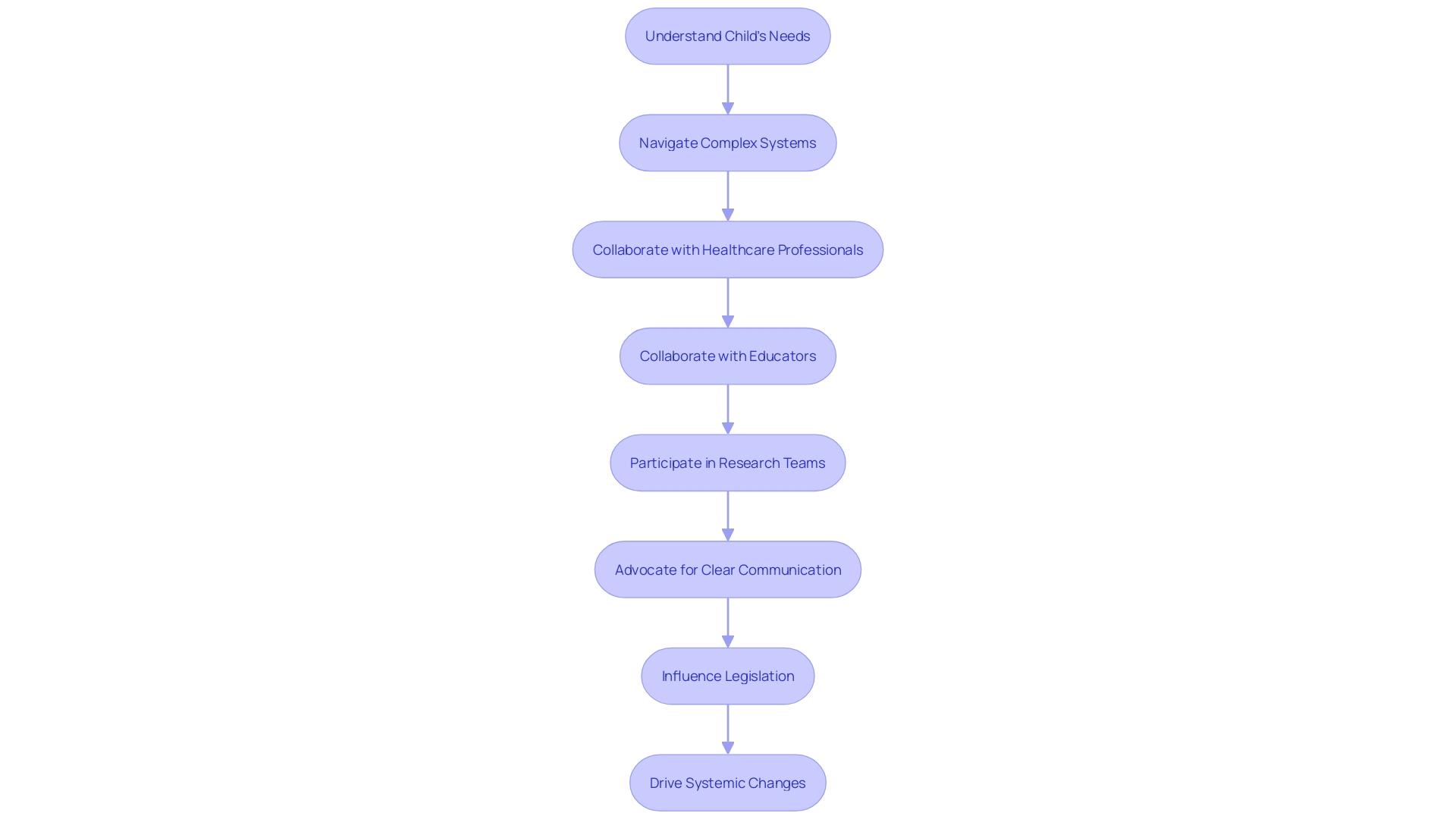
Overcoming Challenges
Navigating the parenting journey can be akin to steering through a labyrinth of complex systems while managing time and resources. It's not uncommon for parent advocates to encounter misinformation or stigma, adding to the already substantial challenges. Recognizing these obstacles is the first step toward developing effective strategies for support and growth.
For instance, understanding the personal experience and expertise of individuals like Darrin Henein, who transitioned from a career in software design to developing educational games for children, showcases how blending professional skills with parenting goals can lead to innovative support systems. Furthermore, research, such as the study published in the journal 'Therapeutic Advances in Vaccines and Immunotherapy,' highlights the necessity for clear and supportive communication channels. It emphasizes the significance of considering the emotional impact of social media on parents' decision-making processes.
By drawing on the resilience demonstrated by parents who navigate their roles amidst adversity, such as those managing adverse childhood experiences (ACEs), we can find inspiration to ask for help and build strong networks of support. Parenting, indeed, is a role that involves continuous learning and adaptation. Leveraging the collective wisdom and experiences of diverse caregivers, from those with disabilities to those advocating for public education, enriches the resources available to all.
These stories and findings underline the importance of embracing the journey of parenting as one of growth, advocacy, and shared experiences.
Collaboration with Schools
Building bridges with educational institutions is a pivotal aspect of advocating for the needs of students. It's through forging strong connections with teachers and staff that parents can contribute to shaping a learning environment tailored to their child's unique abilities and challenges. Involvement in Individualized Education Program (IEP) discussions is more than a formality; it's a platform where parents can offer invaluable insights into their child's world, helping to craft educational approaches that harness their strengths and mitigate their difficulties.
The journey of advocacy extends beyond individual efforts, tapping into the collective power of superintendents, educators, and policy analysts, who together navigate the complex terrain of public education. As underscored by the National Education Association's commitment to public education and the eight-year federal policy dialogues reported in 2015, perseverance in advocacy is indispensable. It's this enduring commitment, rooted in relationships and knowledge sharing, that propels educational progress and ensures that every student's voice is heard and valued in the vast symphony of learning.
Additional Support Services
Supporting a child with autism encompasses more than academic assistance. Holistic support, such as behavioral therapy, speech therapy, and language services, can significantly enhance overall development. These services are pivotal in addressing the unique challenges children may face, including sensory sensitivities and social communication difficulties.
It's crucial to recognize that children with autism and co-occurring emotional and behavioral problems are at a high risk of social exclusion. Therefore, accessing a comprehensive and individualized suite of services and therapies could be the key to equitable and engaged participation in all aspects of life—school, home, and leisure—giving every child a fair chance in their developmental race, as emphasized by Dr. David (Dan) R. Offord.
Recent shifts in autism research highlight the importance of evidence-based practices and the risks of bias in study designs. Clinicians now prefer randomized controlled trials over quasi-experimental studies to determine the efficacy of interventions. Yet, the landscape of autism support is fragmented, with varying opinions on the best approaches.
Early intensive behavioral intervention, considered the standard in the U.S., contrasts with more developmentally-informed interventions that integrate into family routines. It's vital to critically evaluate such intervention research, as the quality and reporting are directly linked to respecting the needs of people with autism.
Caregivers play a critical role in understanding and managing interventions, including being well-informed about the benefits and risks of prescribed medications. Continuous learning about new treatments and therapeutic approaches is essential. As caregivers vet resources and research, it is equally important to consult experts and discern credible information from misleading online narratives.
Autistic children's long-term, meaningful change hinges on interventions that are socially validated, track adverse events transparently, and are free from conflicts of interest.
Conclusion
In conclusion, understanding and supporting the sensory needs of children with Autism Spectrum Disorder (ASD) is vital for parents. Technology, such as AR applications, can help create more accessible environments for children with autism. Ongoing education empowers parents to become better advocates for their children.
Establishing a support network and utilizing effective parenting strategies are crucial for their well-being. Enhancing advocacy skills and collaborating with professionals and services ensure children receive the care they need. Holistic support, such as therapy, contributes to overall development.
By embracing the journey of parenting and leveraging collective efforts, parents can create a world where children with sensory needs can thrive.




